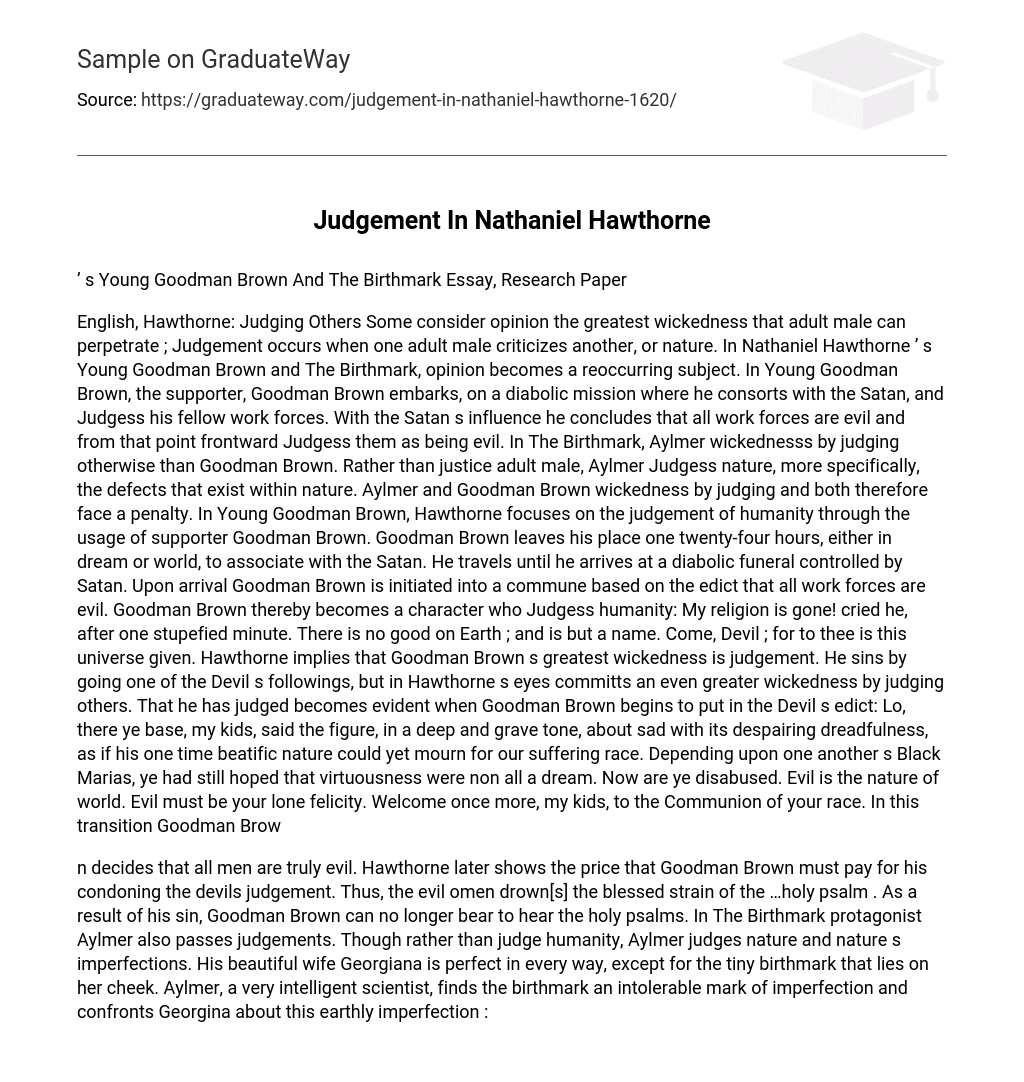In Nathaniel Hawthorne ’ s Young Goodman Brown and The Birthmark, opinion becomes a reoccurring subject. In Young Goodman Brown, the supporter, Goodman Brown embarks, on a diabolic mission where he consorts with the Satan, and Judgess his fellow work forces. With the Satan s influence he concludes that all work forces are evil and from that point frontward Judgess them as being evil. In The Birthmark, Aylmer wickednesss by judging otherwise than Goodman Brown.
Rather than justice adult male, Aylmer Judgess nature, more specifically, the defects that exist within nature. Aylmer and Goodman Brown wickedness by judging and both therefore face a penalty. In Young Goodman Brown, Hawthorne focuses on the judgement of humanity through the usage of supporter Goodman Brown.
Goodman Brown leaves his place one twenty-four hours, either in dream or world, to associate with the Satan. He travels until he arrives at a diabolic funeral controlled by Satan. Upon arrival Goodman Brown is initiated into a commune based on the edict that all work forces are evil. Goodman Brown thereby becomes a character who Judgess humanity: My religion is gone! cried he, after one stupefied minute. There is no good on Earth ; and is but a name. Come, Devil ; for to thee is this universe given.
Hawthorne implies that Goodman Brown s greatest wickedness is judgement. He sins by going one of the Devil s followings, but in Hawthorne s eyes committs an even greater wickedness by judging others. That he has judged becomes evident when Goodman Brown begins to put in the Devil s edict: Lo, there ye base, my kids, said the figure, in a deep and grave tone, about sad with its despairing dreadfulness, as if his one time beatific nature could yet mourn for our suffering race. Depending upon one another s Black Marias, ye had still hoped that virtuousness were non all a dream.
Now are ye disabused. Evil is the nature of world. Evil must be your lone felicity. Welcome once more, my kids, to the Communion of your race. In this transition Goodman Brow n decides that all men are truly evil. Hawthorne later shows the price that Goodman Brown must pay for his condoning the devils judgement. Thus, the evil omen drown[s] the blessed strain of the …holy psalm . As a result of his sin, Goodman Brown can no longer bear to hear the holy psalms.
In The Birthmark protagonist Aylmer also passes judgements. Though rather than judge humanity, Aylmer judges nature and nature s imperfections. His beautiful wife Georgiana is perfect in every way, except for the tiny birthmark that lies on her cheek. Aylmer, a very intelligent scientist, finds the birthmark an intolerable mark of imperfection and confronts Georgina about this earthly imperfection : Ah, upon another face perhaps it might, replied her husband; but never on yours. No, dearest Georgiana, you came so nearly perfect from the hand of Nature, that his slightest possible defect, which we hesitate whether to term a defect or a beauty, shocks me, as being the visible mark of earthly imperfection.
This quote shows that Aylmer has judged nature. He adds to his sins by trying to rid Georgiana’s face of the imperfection which plagues her complexion. His punishment for his judging nature is the loss of his wife, for he gives her a concoction which rids her of not just her imperfection, but life as well. Thus for trying to tamper with nature he loses his perfect wife. Both these stories carry with them tragic endings and show the reader Hawthorne s view on the judging of others and nature.
Both judge others and as a result of their sin, receive a punishment. Both of these characters try to play god, as they criticize and meddle with God s creations. Aylmer is so plagued by the thought of imperfection in Georgiana’s face that he overlooks his natural rights and tries to play a role that only nature can.
In any event Hawthorne finds the sin of judging others the most horrible sin man can commit. Consorting with the Devil is in itself a horrible sin, but Hawthorne implies that it is not this sin which is the greatest sin that Goodman Brown has committed. He instead suggests that the judgement he made while consorting with the devil was his worst crime.





